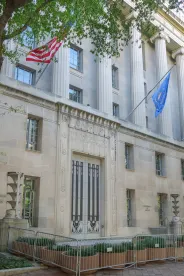On Nov. 29, the U.S. Department of Justice (DOJ) announced a new formal policy with respect to how it will treat a company’s decision to disclose voluntarily a violation of the Foreign Corrupt Practices Act (FCPA). The policy supplants the pilot program created during the Obama Administration aimed at encouraging companies to self-disclose FCPA violations. Deputy Attorney General Rod Rosenstein announced the new policy in a speech on Wednesday at a FCPA conference in Maryland.
PRESUMPTION IN FAVOR OF DECLINATION
The new policy creates a presumption that DOJ will decline to prosecute a company criminally for a FCPA violation so long as the company: (1) reports the violation promptly to DOJ (including identification of culpable individuals): (2) cooperates with the DOJ investigation; and (3) remediates the problem that led to the violation. Under the previous pilot program, DOJ only assured companies that it may decline to bring charges if the company met those conditions, but did not go so far as to create a presumption in favor of declination. Not surprisingly, under the new policy, the company must still disgorge any profits stemming from the violation.
AGGRAVATING CIRCUMSTANCES THAT REBUT THE PRESUMPTION
It also comes as no surprise that the presumption in favor of declination can be rebutted when aggravating circumstances exist. For example, a company will not be eligible for the presumption if:
-
company executives are involved in the violation;
-
the company received “significant profit” from the violation;
-
corruption is “pervasive” within the company; or
-
the company is a repeat violator.
Even in such circumstances, however, the new policy states that a company may still be eligible to receive up to a 50 percent reduction of its fine under the sentencing guidelines.
Plainly, the factors that might create aggravating circumstances are subjective, so that DOJ prosecutors retain substantial discretion in deciding how and when to prosecute FCPA cases criminally. Companies also must consider that the new policy is a DOJ policy; the U.S. Securities and Exchange Commission (SEC) maintains independent enforcement responsibility for FCPA violations, and can levy its own fines and penalties.
VOLUNTARY DISCLOSURE GOING FORWARD
Through the new policy, DOJ is trying to make the decision to disclose a violation easier for companies by increasing the disparity between the probable outcomes if a company discloses as compared to a violation discovered without a disclosure. In his speech, Rosenstein highlighted these differences, noting that most of the recent FCPA cases that did not involve a voluntary disclosure resulted in criminal charges against the company.
But the decision to disclose is more difficult than ever. For example, cooperation with the DOJ investigation (one of the conditions to receiving the declination presumption) often entails so-called “de-confliction” requests from DOJ, whereby the government asks the company to refrain from interviewing certain employees until the DOJ can interview them first. These requests have been controversial at times, because they can hamper a company’s ability to remediate the wrongdoing—itself one of the other conditions to receiving the declination presumption.
If a company discovers a FCPA violation and grapples with how to respond, counsel experienced in FCPA matters are critical. In addition, the importance of implementing an effective FCPA compliance program is more important than ever. The new policy emphasizes that even if DOJ decides to bring a criminal case, if a company implements an effective compliance program, DOJ will not likely insist on the appointment of an independent monitor


 />i
/>i


